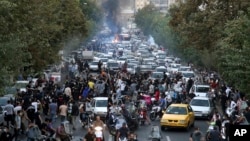Human rights activists in Iran say protester Javad Rouhi, who died in custody, has been buried in his home region while questions remain about the cause of his death.
Rouhi was buried in the village of Kalikan in Amol, reportedly with the presence of officials from the Islamic Republic.
Human Rights Watch said Rouhi died Thursday under suspicious circumstances that raise concerns about his treatment. The Iran Human Rights Organization said Saturday the official medical report lists Rouhi's cause of death as "cardiac arrest." However, officials with the Islamic Revolutionary Guard Corps verbally declared his cause of death a "brain stroke," and a prison statement reportedly said he died following a concussion.
The Mizan media outlet affiliated with Iran’s judiciary system had previously reported that Rouhi had suffered from "seizures" in prison.
Lawyer Saleh Nikbakht, who does not represent Rouhi, said that similar incidents have occurred involving some of his clients, and that he is closely following Rouhi’s case.
Nikbakht told the Ham-Mihan newspaper, "I don't want to attribute these untimely deaths to any specific person, whether in a real or legal capacity." However, he noted that "based on the law," and even though Rouhi’s initial "three death penalties" had been overturned by the Supreme Court of the Islamic Republic, "Javad's temporary detention should have been converted into a less severe form of imprisonment."
Human Rights Watch said in a Friday press release Rouhi was tortured following his arrest during widespread protests in Iran in September 2022. He was convicted two months later after what the group called an unfair trial.
The rights group said Nowshahr prison in Mazandaran province, north of Tehran, issued a statement Thursday that Rouhi had been transferred to a hospital early that morning “following a concussion” but died despite receiving medical assistance.




